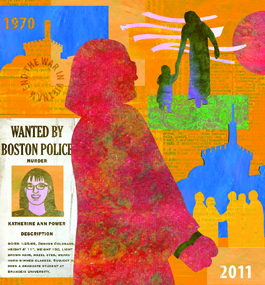Turning Points
My Surrender and Return

Illustration by Elizabeth Rosen
by Kathy Power '71
Last May I chanced to meet an old Brandeis classmate at a fundraising brunch. She was on the planning committee for the upcoming 40th Reunion of the Class of ’71, the class I would have graduated with if I hadn’t so terribly wrecked everything in September 1970. She enthusiastically invited me to attend.
“But I didn’t graduate,” I said. “I am not, properly speaking, an alum.”
“No one cares about that,” she replied.
It seemed impossible that no one would care, considering why I was not an alum: When I should have been starting my senior year, I was robbing a bank with two other Brandeis students and a couple of thugs — a crime during which Boston police officer Walter Schroeder was killed.
I certainly cared. I was ashamed and embarrassed by the recklessness and ingratitude I had shown Brandeis, the university that had been so generous to me, that had opened the gates of my provincial Catholic ghetto and shown me the world. I knew that my acts in 1970 cost the Brandeis community — students, faculty, administration, donors, alumni — a great deal, in harassment, invasion, loss of good will and financial support, shame and embarrassment.
In 1993, after living 23 years as a fugitive, I surrendered myself to face charges of robbery and murder, and I began slowly to repair some of what I had broken. I stepped out of hiding from my past. I offered my body for imprisonment to begin to pay for my years of living as an outlaw. I offered my suffering to balance in some small way the suffering of Walter Schroeder’s family and community over his death. And, when the first offering was not seen as enough, I offered more by withdrawing my request for parole and spending an additional year and a half in prison.
These offerings were the beginning, but the real repair required my own inner work. A Brandeis friend gave me the Hebrew word for the process, tshuvah. With much help, both spiritual and psychological, I surrendered my innermost self to the deeply humiliating experience of owning up to my faults and looking at my deeds through God’s eyes. I let the story of myself and my life truly penetrate my defenses and shatter me. I let myself come to see that my worldview and my insights into the truth had been wrong, to use the language of Rabbi Yaakov Feldman.
Now here, in front of me, was an invitation to step out of shameful hiding and imagine beginning to repair my relationship with Brandeis. I decided that if my class would let me register for the reunion, I would attend. Online registration was as simple as entering an email address and a credit card number.
On Saturday, June 11, at 3:30 in the afternoon, I walked into Pearlman Lounge, the long-ago site of the National Strike Information Center. This is where I had worked myself to exhaustion, and then to despair, against an insane, endless war in Vietnam, where finally I abandoned every good and decent thing I knew and traded my powerlessness for rage, and for the delusion of efficacy.
Over the years I had reconnected warmly with a couple of friends from Brandeis, but those relationships existed only in the present; that they began at Brandeis was nowhere near the center of the story. I don’t know what I was expecting that day’s gathering of the Class of ’71 to be. I just knew that I was willing to show up, to recover one personal relationship, to restore one broken connection.
A reunion is an interesting time, specially dedicated to looking at where we are today and how it is connected to our past. I hoped that some of my classmates could see not just my actions of 40 years ago, and not just my 23 years of dodging accountability, but my process of deepening surrender since 1993.
I wasn’t prepared for the warmth, for the embrace, for the sense that the threads of a broken story were knitting themselves together, a story of those times, of the lives we had all lived since. Is it really you, Kathy Power? I heard that you might be here. How are you? Are you all right? Tell me everything. Let me tell you everything.
And more than anything else, What are you doing now? I tell them I am doing what many of us do at this age. I am a grandmother. I tell the stories every chance I get — of my turn to violence, the destruction it caused, and my return.
Kathy Power is an AIDS activist in Boston. She writes a blog at www.practicalpeace.com/blog.html.
